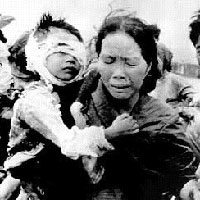 |
| FallofSaigon.org-Mass Exodus |
Organizations and nations are discussing what might be a solution to end the civil war in Syria. From this American's perspective--and for reasons of humanitarian, geopolitical, and national resources, history, and/or religious interests--it is clear that influential Americans have different views. Those views usually include a disinclination to stay out of other regions' wars, a desire to see conflict, and its attendant suffering, end.
Most Americans are war-weary and war-disillusioned. The solutions expected from going to war, since Korea, have not sufficed. I am not one to rush to a "war solution" view, and I think citizens and voters are weary of U. S. involvement in wars of recent years. As national puzzles grow, if there is a Syria Solution it is not appearing yet on thought-boards, charts, or known lists of acceptable options.
"Blood and treasure" is a phrase depicting the human costs of war. Groups like Wounded Warriors remind us of the severity of costs borne by combat survivors. They present a clear picture of "blood and treasure" through the faces, wounds visible and invisible, and families of fighters. We know their wounds could be ours or our families'...and some are.
In the 20th century, brain-trust names, presidential advisers, and Pentagon giants like Robert McNamara thought their analyses were correct. In his later memoirs, Robert McNamara wrote that he had long before realized that the Vietnam War, for which he had been a leading strategist, was "wrong, terribly wrong."
To leave dictators in place or to take them out has been an unanswered existential question of U. S. foreign policy. Where is the U. S. Congress regarding matters of advice and consultation? The second part of the war powers resolution, for example, reads that the President is required "to consult with Congress before introducing U.S. armed forces into hostilities or situations where hostilities are imminent, and to continue such consultations as long as U.S. armed forces remain in such situations (50 USC Sec. 1542)
We cannot make other nations' civil wars or dictatorships our military business unless we are prepared with clear, imperative reasons able to past tests learned in U. S. recent war history. The photo on this page, a mother and wounded child fleeing an overrun Saigon in 1975 when the U. S. was driven from Saigon, is a harsh, yet necessary, reminder that when we try out of fear or any reason not soberly considered, we may do more harm than good in the end.
The U. S. was attacked by four civilian planes turned into tools of terror on 9/11/01. Defending against another such attack and any attacks, smaller or larger, is our present war, at home and through intelligence abroad. That war continues, a different kind of combat. I care about Syria and the whole middle east, and they are subjects of prayer. Yet, I do not think we can solve these problems militarily.
(c) 2013 Opinari Writers blog
The U. S. was attacked by four civilian planes turned into tools of terror on 9/11/01. Defending against another such attack and any attacks, smaller or larger, is our present war, at home and through intelligence abroad. That war continues, a different kind of combat. I care about Syria and the whole middle east, and they are subjects of prayer. Yet, I do not think we can solve these problems militarily.
(c) 2013 Opinari Writers blog

No comments:
Post a Comment